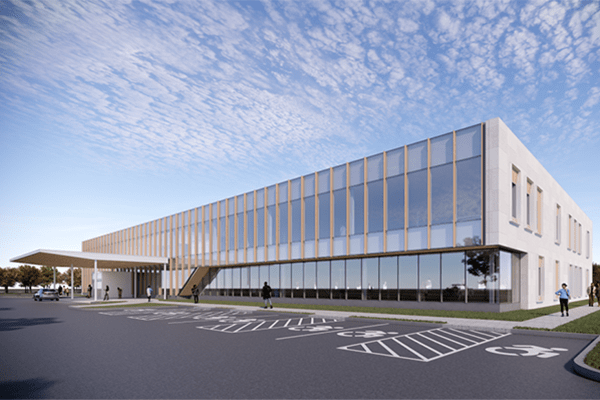|
RCBJ-Audible (Listen For Free)
|
Clarkstown Planning Board To Consider Application For Subdivision & Plan For Ambulatory Orthopedic Care Center
By Tina Traster
Montefiore Nyack Hospital, along with a healthcare real estate developer and operator, is hoping to build an ambulatory care center in West Nyack on the former Cambridge University Press site.
Aspect Health of Westport, CT is working with Montefiore Nyack to create a “human-centered muscular center with state-of-the-art orthopedic clinical space that offers advancements of radiology, and rehabilitation services, according to their application to the Town of Clarkstown Planning Board.
On Wednesday, the Planning Board will consider a site plan and subdivision application from the applicant which hopes to subdivide the undeveloped southeastern portion of the 35.2-acre site, which is owned by 2167 CPA Development Corp., and build a two-story 60,000-square-foot ambulatory care center with 229 parking spaces on five acres.
Aspect Health is a real estate advisor, investor, and developer with a specialization in “the emerging field of healthcare hospitality,” according to the company’s website.
“We design advanced healthcare facilities using the latest research and technologies to deliver a significantly better overall experience — not only for patients, but for the providers who care for them and the health systems that serve them,” the website says.
The existing 489,000-square-foot warehouse at 100-110 Brookhill Drive, would remain on the site, which is zoned CO (commercial/office). The property was originally home to the Cambridge University Press building.
The applicant, including Dr. Mark Geller, president and CEO of Montefiore Nyack as well as representatives from Aspect Health, appeared before Clarkstown’s Technical Advisory Committee on May 19th. The Planning Board is set to consider the relocation of 54 reserved parking spaces from the southeast of the site to the north; a proposed two-lot subdivision; and the proposed ambulatory care center with 229 parking spaces.
The project requires no variances.
Ambulatory care is undergoing a fundamental transformation.
For many years, the concentration of health care has been at the medical center or hospital. Traditionally, architects have designed health care within the medical center model where care services are centrally located. By doing this, medical centers have inadvertently created an “island” from the community it serves. But that is changing.
“We formed Aspect Health because we saw a need to address the rapid transformation that’s causing dysfunction and inefficiencies at the intersection of healthcare and real estate,” said Christopher Smith, CEO of Aspect Health. Aspect Health advises healthcare leaders to leverage real estate as part of their overall business strategy by developing “comprehensive solutions that go well beyond the physical space,” the company says.
The health care industry is undergoing major shifts in the last few years, from consolidations and consumerization to evolving technologies. Consumer segmentation based on values, beliefs, priorities, attitudes, and lifestyle is becoming essential to attract, engage and retain patients. Health systems are asking: How can we provide easier community access to wellness, primary and secondary care?
Further, national studies show the costs of procedures at ambulatory surgery centers can be from 40 percent to 60 percent less expensive than hospitals. Local surgery centers have less overhead in supplies, less waste, and more efficient preparations because they generally serve otherwise healthy patients for elective procedures during weekday business hours.











